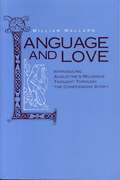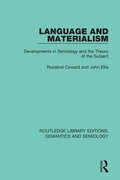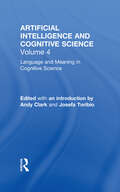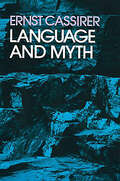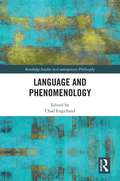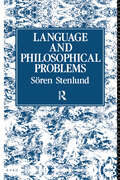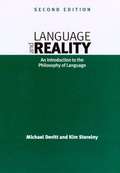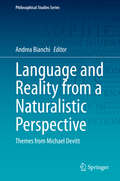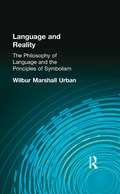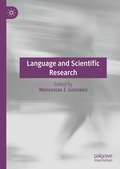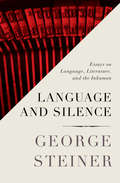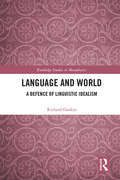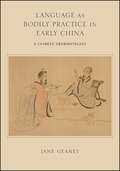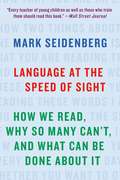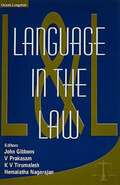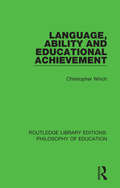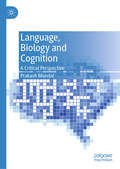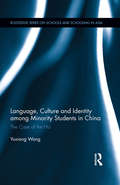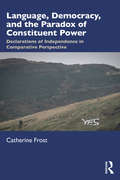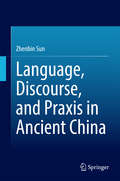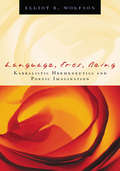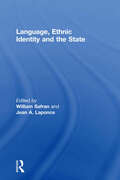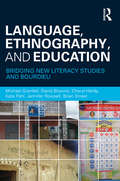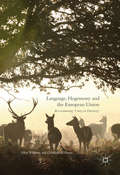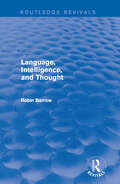- Table View
- List View
Language and Love: Introducing Augustine's Religious Thought Through the Confessions Story (G - Reference, Information and Interdisciplinary Subjects)
by William MallardThis is the first work to combine an introduction to Augustine's Confessions with a larger outline of his mature theology. Mallard provides guidance for reading the narrative Confessions (Books I–IX) and at the same time, by certain extensions and comments, reveals the three major topical divisions within Augustine's thought: creation, salvation, and the City of God. Mallard is able to do this because Augustine's affirmation of the good of Creation, his view of the human will and God's grace (and the nature of evil), his sense of a religious people's identity and their hope, and his view of faith and reason were all essentially in place at the time of the Confessions.Mallard argues that Augustine was not "in search of himself" in a modern sense but in search of a language of prayer, praise, and truth that would locate him within God's grace. That language turned out to be the language of Incarnation, which remains compelling and inviting today. As a classic work, the Confessions is a monument to its own time, but it has striking resonances for our own. Mallard's interpretation will challenge readers to begin working out their own. The Confessions endures because it is a story that illumines the stories of many, even to the present day. To analyze how it is like, and unlike, modern experiences is to exercise both mind and heart. In that respect, Language and Love is a kind of theological meditation on the Confessions testing out a horizon of belief. Mallard views Augustine as a master of the spoken word in an age of broken and abused language and the Confessions as a historic masterpiece of rhetoric. He contends that Augustine is the ancestor of many today who offer social and political hope through fresh rhetorical vitality.
Language and Materialism: Developments in Semiology and the Theory of the Subject (Routledge Library Editions: Semantics and Semiology #5)
by John Ellis Rosalind CowardFirst published in 1977, this book presents a comprehensive and lucid guide through the labyrinths of semiology and structuralism — perhaps the most significant systems of study to have been developed in the twentieth century. The authors describe the early presuppositions of structuralism and semiology which claim to be a materialist theory of language based on Saussure’s notion of the sign. They show how these presuppositions have been challenged by work following Althusser’s development of the Marxist theory of ideology, and by Lacan’s re-reading of Freud. The book explains how the encounter of two disciplines — psychoanalysis and Marxism — on the ground of their common problem —language — has produced a new understanding of society and its subjects. It produces a critical re-examination of the traditional Marxist theory of ideology, together with the concepts of sign and identity of the subject.
Language and Meaning in Cognitive Science: Cognitive Issues and Semantic theory (Artificial Intelligence And Cognitive Science Ser.)
by Andy Clark Josefa ToribioSummarizes and illuminates two decades of researchGathering important papers by both philosophers and scientists, this collection illuminates the central themes that have arisen during the last two decades of work on the conceptual foundations of artificial intelligence and cognitive science. Each volume begins with a comprehensive introduction that places the coverage in a broader perspective and links it with material in the companion volumes. The collection is of interest in many disciplines including computer science, linguistics, biology, information science, psychology, neuroscience, iconography, and philosophy. Examines initial efforts and the latest controversiesThe topics covered range from the bedrock assumptions of the computational approach to understanding the mind, to the more recent debates concerning cognitive architectures, all the way to the latest developments in robotics, artificial life, and dynamical systems theory. The collection first examines the lineage of major research programs, beginning with the basic idea of machine intelligence itself, then focuses on specific aspects of thought and intelligence, highlighting the much-discussed issue of consciousness, the equally important, but less densely researched issue of emotional response, and the more traditionally philosophical topic of language and meaning. Provides a gamut of perspectives The editors have included several articles that challenge crucial elements of the familiar research program of cognitive science, as well as important writings whose previous circulation has been limited. Within each volume the papers are organized to reflect a variety of research programs and issues. The substantive introductions that accompany each volume further organize the material and provide readers with a working sense of the issues and the connection between articles.
Language and Myth
by Ernst CassirerIn this important study Ernst Cassirer analyzes the non-rational thought processes that go to make up culture. He demonstrates that beneath both language and myth there lies an unconscious "grammar" of experience, whose categories and canons are not those of logical thought. He shows that this prelogical "logic" is not merely an undeveloped state of rationality, but something basically different, and that this archaic mode of thought still has enormous power over even our most rigorous thought, in language, poetry and myth.The author analyzes brilliantly such seemingly diverse (yet related) phenomena as the metaphysics of the Bhagavat Gita, the Melanesian concept of Mana, the Naturphilosophie of Schelling, modern poetry, Ancient Egyptian religion, and symbolic logic. He covers a vast range of material that is all too often neglected in studies of human thought.These six essays are of great interest to the student of philosophy or the philosophy of science, the historian, or the anthropologist. They are also remarkably timely for students of literature, what with the enormous emphasis placed upon "myth" in modern literary speculation. This book is not superficial speculation by a dabbler, but a penetrating study by one of the most profound and sensitive philosophic minds of our time.
Language and Phenomenology (Routledge Studies in Contemporary Philosophy)
by Chad EngellandAt first blush, phenomenology seems to be concerned preeminently with questions of knowledge, truth, and perception, and yet closer inspection reveals that the analyses of these phenomena remain bound up with language and that consequently phenomenology is, inextricably, a philosophy of language. Drawing on the insights of a variety of phenomenological authors, including Husserl, Heidegger, Merleau-Ponty, Gadamer, and Ricoeur, this collection of essays by leading scholars articulates the distinctively phenomenological contribution to language by examining two sets of questions. The first set of questions concerns the relatedness of language to experience. Studies exhibit the first-person character of the philosophy of language by focusing on lived experience, the issue of reference, and disclosive speech. The second set of questions concerns the relatedness of language to intersubjective experience. Studies exhibit the second-person character of the philosophy of language by focusing on language acquisition, culture, and conversation. This book will be of interest to scholars of phenomenology and philosophy of language.
Language and Philosophical Problems
by Sören StenlundLanguage and Philosophical Problems investigates problems about mind, meaning and mathematics rooted in preconceptions of language. It deals in particular with problems which are connected with our tendency to be misled by certain prevailing views and preconceptions about language. Philosophical claims made by theorists of meaning are scrutinized and shown to be connected with common views about the nature of certain mathematical notions and methods. Drawing in particular on Wittgenstein's ideas, Sren Stenlund demonstrates a strategy for tracing out and resolving conceptual and philosophical problems. By a critical examination of examples from different areas of philosophy, he shows that many problems arise through the transgression of the limits of the use of technical concepts and formal methods. Many prima facie different kinds of problems are shown to have common roots, and should thus be dealt and resolved together. Such an approach is usually prevented by the influence of traditional philosophical terminology and classification. The results of this investigation make it clear that the received ways of subdividing the subject matter of philosophy often conceal the roots of the problem.
Language and Reality
by Michael Devitt Kim SterelnyOur philosophical approach remains realist and naturalist and that approach permeates the work.
Language and Reality from a Naturalistic Perspective: Themes from Michael Devitt (Philosophical Studies Series #142)
by Andrea BianchiThis book celebrates the many important contributions to philosophy by one of the leading philosophers in the analytic field, Michael Devitt.It collects seventeen original essays by renowned philosophers from all over the world. They all develop themes from Devitt’s work, thus discussing many fundamental issues in philosophy of linguistics, theory of reference, theory of meaning, methodology, and metaphysics.In a long final chapter, Devitt himself replies to the contributors. In so doing, he further elaborates his views on various of these issues, for example defending his claim (in opposition to Chomskyan orthodoxy) that languages are external rather than internal; his well-known causal theory of reference; his “shocking” idea that meanings can be causal, non-descriptive, modes of presentation; his methodological naturalism; his commitment to scientific realism; and his version of biological essentialism. The volume will appeal to all scholars and students interested in contemporary theoretical analytic philosophy, and will be a must-read for any serious researcher in philosophy of language. It provides a deep insight into the work of one of the most important living philosophers, and will help readers to better understand language and reality from a naturalistic perspective.
Language and Reality: The Philosophy of Language and the Principles of Symbolism
by Wilbur Marshall UrbanFirst published in 2002. Routledge is an imprint of Taylor & Francis, an informa company.
Language and Scientific Research
by Wenceslao J. GonzalezThis book analyzes the role of language in scientific research and develops the semantics of science from different angles. The philosophical investigation of the volume is divided into four parts, which covers both basic science and applied science: I) The Problem of Reference and Potentialities of the Language in Science; II) Language and Change in Scientific Research: Evolution and Historicity; III) Scientific Language in the Context of Truth and Fiction; and IV) Language in Mathematics and in Empirical Sciences. Language plays a key role in science: our access to the theoretical, practical or evaluative dimensions of scientific activity begins with the mastery of language, continues with a deepening in the use of language and reaches the level of contribution when it creates new terms or changes them in sense and reference. This reveals the compatibility between objectivity in semantic contents and historicity in the progress of science. This volume is a valuable enrichment to students, academics and other professionals interested in science in all its forms, who seek to deepen the role that language plays in its structure and dynamics.
Language and Silence: Essays on Language, Literature, and the Inhuman (Peregrines Ser.)
by George SteinerThe evolution and manipulation of language from the celebrated author of After Babel. &“A keenly discriminating literary mind at work on what it loves&” (The New York Times Book Review).Language and Silence is a book about language—and politics, meaning, silence, and the future of literature. Originally published between 1958 and 1966, the essays that make up this collection ponder whether we have passed out of an era of verbal primacy and into one of post-linguistic forms—or partial silence. Steiner explores the idea of the abandonment of contemporary literary criticism, from the classics to the works of William Shakespeare, Lawrence Durell, Thomas Mann, Leon Trotsky, and more.
Language and World: A Defence of Linguistic Idealism (Routledge Studies in Metaphysics)
by Richard GaskinThis book defends a version of linguistic idealism, the thesis that the world is a product of language. In the course of defending this radical thesis, Gaskin addresses a wide range of topics in contemporary metaphysics, philosophy of language, philosophical logic, and syntax theory. Starting from the context and compositionality principles, and the idea of a systematic theory of meaning in the Tarski–Davidson tradition, Gaskin argues that the sentence is the primary unit of linguistic meaning, and that the main aspects of meaning, sense and reference, are themselves theoretical posits. Ontology, which is correlative with reference, emerges as language-driven. This linguistic idealism is combined with a realism that accepts the objectivity of science, and it is accordingly distinguished from empirical pragmatism. Gaskin contends that there is a basic metaphysical level at which everything is expressible in language; but the vindication of linguistic idealism is nuanced inasmuch as there is also a derived level, asymmetrically dependant on the basic level, at which reality can break free of language and reach into the realms of the unnameable and indescribable. Language and World will be of interest to scholars and advanced students working in metaphysics, philosophy of language, and linguistics.
Language as Bodily Practice in Early China: A Chinese Grammatology (SUNY series in Chinese Philosophy and Culture)
by Jane GeaneyJane Geaney argues that early Chinese conceptions of speech and naming cannot be properly understood if viewed through the dominant Western philosophical tradition in which language is framed through dualisms that are based on hierarchies of speech and writing, such as reality/appearance and one/many. Instead, early Chinese texts repeatedly create pairings of sounds and various visible things. This aural/visual polarity suggests that texts from early China treat speech as a bodily practice that is not detachable from its use in everyday experience. Firmly grounded in ideas about bodies from the early texts themselves, Geaney's interpretation offers new insights into three key themes in these texts: the notion of speakers' intentions (yi), the physical process of emulating exemplary people, and Confucius's proposal to rectify names (zhengming).
Language at the Speed of Sight: How We Read, Why So Many Can't, And What Can Be Done About It
by Mark SeidenbergAccording to a leading cognitive scientist, we've been teaching reading wrong. The latest science reveals how we can do it right. <p><p>In 2011, when an international survey reported that students in Shanghai dramatically outperformed American students in reading, math, and science, President Obama declared it a "Sputnik moment": a wake-up call about the dismal state of American education. Little has changed, however, since then: over half of our children still read at a basic level and few become highly proficient. <p><p> Many American children and adults are not functionally literate, with serious consequences. Poor readers are more likely to drop out of the educational system and as adults are unable to fully participate in the workforce, adequately manage their own health care, or advance their children's education. <p><p>In Language at the Speed of Sight, internationally renowned cognitive scientist Mark Seidenberg reveals the underexplored science of reading, which spans cognitive science, neurobiology, and linguistics. As Seidenberg shows, the disconnect between science and education is a major factor in America's chronic underachievement. <p><p>How we teach reading places many children at risk of failure, discriminates against poorer kids, and discourages even those who could have become more successful readers. Children aren't taught basic print skills because educators cling to the disproved theory that good readers guess the words in texts, a strategy that encourages skimming instead of close reading. <p><p>Interventions for children with reading disabilities are delayed because parents are mistakenly told their kids will catch up if they work harder. Learning to read is more difficult for children who speak a minority dialect in the home, but that is not reflected in classroom practices. By building on science's insights, we can improve how our children read, and take real steps toward solving the inequality that illiteracy breeds. <p><p>Both an expert look at our relationship with the written word and a rousing call to action, Language at the Speed of Sight is essential for parents, educators, policy makers, and all others who want to understand why so many fail to read, and how to change that.
Language in the Law
by John Carey V. Prakasam John Gibbons K. V. TirumaleshThe Language in the Law records the different modes and practices in the use of language related to law. The nexus between language and the law in various countries and cultures is examined in this book.
Language, Ability and Educational Achievement (Routledge Library Editions: Philosophy of Education #20)
by Christopher WinchThis title, first published in 1990, engages in the current debates about the teaching of literacy and the reform of education. Based on his dissatisfaction with prevalent theories of educational achievement and his experience of teaching in elementary schools, Winch argues that the dichotomy of biological inheritance and environmental influence is inadequate to describe the diverse phenomena of educational achievement. This title will be of interest to students of the philosophy of education.
Language, Biology and Cognition: A Critical Perspective
by Prakash MondalThis book examines the relationship between human language and biology in order to determine whether the biological foundations of language can offer deep insights into the nature and form of language and linguistic cognition. Challenging the assumption in biolinguistics and neurolinguistics that natural language and linguistic cognition can be reconciled with neurobiology, the author argues that reducing representation to cognitive systems and cognitive systems to neural populations is reductive, leading to inferences about the cognitive basis of linguistic performance based on assuming (false) dependencies. Instead, he finds that biological implementations of cognitive rather than the biological structures themselves, are the driver behind linguistic structures. In particular, this book argues that the biological roots of language are useful only for an understanding of the emergence of linguistic capacity as a whole, but ultimately irrelevant to understanding the character of language. Offering an antidote to the current thinking embracing ‘biologism’ in linguistic sciences, it will be of interest to readers in linguistics, the cognitive and brain sciences, and the points at which these disciplines converge with the computer sciences.
Language, Culture, and Identity among Minority Students in China: The Case of the Hui (Routledge Series on Schools and Schooling in Asia #3)
by Yuxiang WangThis book explores Hui (one of the Muslim minority groups in China) students’ lived experiences in an elementary school in central P. R. China from the perspectives of philosophical foundations of education and the sociology of education, the impact of their experiences on their identity construction, and what schooling means to Hui students. The book describes a vivid picture of how the Hui construct their own identities in the public school setting, and how the state curricula, teachers, and parents play roles in student identity construction. The objectives of the book are to discover factors that impact Hui students’ identity construction and have caused Hui students to know little about their own culture and language; and to explore what should be done to help teachers, administrators, and policy makers appreciate minority culture and include minority culture and knowledge in school curriculum in order to meet the needs of Hui students.The book provides historical, policy, and curricular contexts for readers to understand Hui students’ experiences in central China, and discusses the cultural differences between Han and Hui from a philosophical level. The book uses postcolonial theory to critique the assimilative nature of school education, the construction of Hui students’ identity from Han ideology, and the cultural hegemony of the mainstream Han group. It also discusses curriculum reconceptualization both in China and globally, and the possibility of multicultural education in China.
Language, Democracy, and the Paradox of Constituent Power: Declarations of Independence in Comparative Perspective
by Catherine FrostIn this book, Catherine Frost uses evidence and case studies to offer a re-examination of declarations of independence and the language that comprises such documents. Considered as a quintessential form of founding speech in the modern era, declarations of independence are however poorly understood as a form of expression, and no one can completely account for how they work. Beginning with the founding speech in the American Declaration, Frost uses insights drawn from unexpected or unlikely forms of founding in cases like Ireland and Canada to reconsider the role of time and loss in how such speech is framed. She brings the discussion up to date by looking at recent debates in Scotland, where an undeclared declaration of independence overshadows contemporary politics. Drawing on the work of Hannah Arendt and using a contextualist, comparative theory method, Frost demonstrates that the capacity for renewal through speech arises in aspects of language that operate beyond conventional performativity. Language, Democracy, and the Paradox of Constituent Power is an excellent resource for researchers and students of political theory, democratic theory, law, constitutionalism, and political history.
Language, Discourse, and Praxis in Ancient China
by Zhenbin SunThis book investigates Chinese comprehension and treatment of the relationship between language and reality. The work examines ancient Chinese philosophy through the pair of concepts known as ming-shi. By analyzing the pre-Qin thinkers' discourse on ming and shi, the work explores how Chinese philosophers dealt with issues not only in language but also in ontology, epistemology, ethics, axiology, and logic. Through this discourse analysis, readers are invited to rethink the relationship of language to thought and behavior. The author criticizes and corrects vital misunderstandings of Chinese culture and highlights the anti-dualism and pragmatic character of Chinese thoughts. The rich meaning of the ming-shi pair is displayed by revealing its connection to other philosophical issues. The chapters show how discourse on language and reality shapes a central characteristic of Chinese culture, the practical zhi. They illuminate the interplay of Chinese theories of language and Dao as Chinese wisdom and worldview. Readers who are familiar with pragmatics and postmodernism will recognize the common points in ancient Chinese philosophy and contemporary Western philosophy, as they emerge through these chapters. The work will particularly appeal to scholars of philosophy, philosophy of language, communication studies and linguistics.
Language, Eros, Being: Kabbalistic Hermeneutics and Poetic Imagination
by Elliot R. WolfsonThis long-awaited, magisterial study-an unparalleled blend of philosophy, poetry, and philology-draws on theories of sexuality, phenomenology, comparative religion, philological writings on Kabbalah, Russian formalism, Wittgenstein, Rosenzweig, William Blake, and the very physics of the time-space continuum to establish what will surely be a highwater mark in work on Kabbalah. Not only a study of texts, Language, Eros, Being is perhaps the fullest confrontation of the body in Jewish studies, if not in religious studies as a whole.Elliot R. Wolfson explores the complex gender symbolism that permeates Kabbalistic literature. Focusing on the nexus of asceticism and eroticism, he seeks to define the role of symbolic and poetically charged language in the erotically configured visionary imagination of the medieval Kabbalists. He demonstrates that the traditional Kabbalistic view of gender was a monolithic and androcentric one, in which the feminine was conceived as being derived from the masculine. He does not shrink from the negative implications of this doctrine, but seeks to make an honest acknowledgment of it as the first step toward the redemption of an ancient wisdom.Comparisons with other mystical traditions-including those in Christianity, Buddhism, and Islam-are a remarkable feature throughout the book. They will make it important well beyond Jewish studies, indeed, a must for historians of comparative religion, in particular of comparative mysticism.Praise for Elliot R. Wolfson:"Through a Speculum That Shines is an important and provocative contribution to the study of Jewish mysticism by one of the major scholars now working in this field."-Speculum
Language, Ethnic Identity and the State
by William Safran and Jean A. LaponceThis new study powerfully asserts the pivotal importance of the interplay between language and ethnicity, which is often underestimated as a component for political stability. These leading scholars present five key case studies of South Africa, Algeria, Canada, Latvia and Senegal. All five countries are multilingual nations where language has been a central political issue that has challenged their unity and stability.These studies are underpinned by two general, comparative and theoretical discussions, which analyse how scholars consider social class and economic factors to be the primary sources for political cohesion or of malcontent with the system and the new avenues opened by a focus on issues of langauge. This book will be of great interest to all students and scholars of linguistics, language, politics and sociology. This is a special issue of the leading journal Nationalism and Ethnic Politics.
Language, Ethnography, and Education: Bridging New Literacy Studies and Bourdieu (Real Language Ser.)
by Jennifer Rowsell Kate Pahl Michael Grenfell David Bloome Brian V Street Cheryl HardyThis frontline volume contributes to the social study of education in general and literacy in particular by bringing together in a new way the traditions of language, ethnography, and education. Integrating New Literacy Studies and Bourdieusian sociology with ethnographic approaches to the study of classroom practice, it offers an original and useful reference point for scholars and students of education, language, and literacy wishing to incorporate Bourdieu’s ideas into their work. More than just a set of stand-alone chapters around social perspectives on language interactions in classrooms, this book develops and unfolds dialogically across three sections: Bridging New Literacy Studies and Bourdieu – Principles; Language, Ethnography and Education - Practical Studies; Working at the Intersections – In Theory and Practice. The authors posit ‘Classroom Language Ethnography’ as a genuinely new perspective with rich and developed traditions behind it, but distinct from conventional approaches to literacy and education — an approach that bridges those traditions to yield fresh insights on literacy in all its manifestations, thereby providing a pathway to more robust research on language in education.
Language, Hegemony and the European Union
by Glyn Williams Gruffudd WilliamsThis book critically examines the European Union's "Unity in Diversity" mantra with regard to language. It uses a theoretical framework based on hegemony both as a system and as a relationship. Operating within sociolinguistics, the book replaces the notion of ideology in poststructuralist thought with that of hegemony. The authors argue that forging unity across language communities contradicts the tenets of classical liberal theory. Global neo-liberalism influences this orthodoxy, shifting the parameters of power and political control. Over nine chapters, the authors cover topics such as globalization and social change, justice, governance and education. The book will be of interest to sociolinguists, political scientists, sociologists, as well as scholars of language and globalization and European studies.
Language, Intelligence, and Thought (Routledge Revivals)
by Robin BarrowIn this text, first published in 1993, Barrow decisively rejects the traditional assumption that intelligence has no educational significance and contends instead that intelligence is developed by the enlargement of understanding. Arguing that much educational research is driven by a concept of intelligence that has no obvious educational relevance, Dr Barrow suggests that this is partly due to a widespread lack of understanding about the nature and point of philosophical analysis, and partly due to a failure to face up to the value judgements that are necessarily involved in analysing a concept such as intelligence. If intelligence is to be of educational significance, it must be understood in terms that allow it to be educable. Written by a philosopher of education, this study offers a reasoned and extended argument in favour of an original view of philosophical analysis. It focuses on the issue of intelligence from a philosophical perspective. It should be of interest to students of education, philosophy and the philosophy of education alike.
